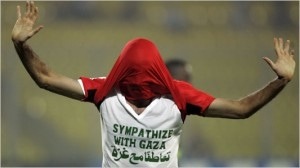 The Football Scholars Forum, an international online think tank, convened on November 14 to discuss Football in the Middle East. The conversation focused on a special issue of the academic journal Soccer and Society, edited by Alon Raab and Issam Khalidi. The group began by noting that while football has been a critical force in broader political and cultural developments in the region, there is little institutional support for studying the game in the Middle East.
The Football Scholars Forum, an international online think tank, convened on November 14 to discuss Football in the Middle East. The conversation focused on a special issue of the academic journal Soccer and Society, edited by Alon Raab and Issam Khalidi. The group began by noting that while football has been a critical force in broader political and cultural developments in the region, there is little institutional support for studying the game in the Middle East.
The ensuing 90-minute discussion demonstrated the value of scholarly collaboration and research on the game. The group explored a dizzying number of topics and territories, including football as a source of unity and hope and as a site of political and ideological conflict; the 2022 World Cup in Qatar; soccerpolitics in Turkey; sport and Islamism; Palestinian and Iraqi Kurdish women’s teams; and football films and poetry.
For a Storify Twitter timeline click here.
Download the mp3 of the session here.
Tag: James Dorsey
Death Match for the Egyptian Revolution?
Egypt’s worst-ever soccer disaster: at least 73 people died at a match in Port Said on Wednesday. “This tragedy is not simply a story of a match gone horribly awry,” writes James Dorsey at The Turbulent World of Middle East Soccer blog. “It will have important and wide-ranging political ramifications.” (Full post here.) The causes for the tragedy are unclear.
According to the New York Times, “Politicians, fans and Egyptian soccer officials all faulted the police as failing to conduct the standard gate searches to prevent fans from bringing knives, clubs or other weapons into the match.” Did the ultras — hard-core supporters — of home side El Masry and Cairo heavyweights Al Ahly walk into a trap?
Tensions between the ultras were high in the build up to the match. Taunts and scuffles in the terraces halted the game early on. El Masry won 3-1, but as the final whistle blew fans invaded the pitch and chased the Al Ahly players. Egyptian television footage (see above) shows undermanned law enforcement standing passively during the chaos.
“People here are dying, and no one is doing a thing. It’s like a war,” said Al Ahly star midfielder Mohamed Aboutrika; “Is life this cheap?” He then promptly announced his retirement from the professional game.
“The ultras whether they walked into a trap or initiated the Port Said violence have no doubt again dug themselves into a hole,” Dorsey observes (full post here). “This time round it will be a lot tougher to dig themselves out. They have played into the hands of the military and the police in dealing a lethal blow [to] contentious street politics as opposed to electoral politics and the horse trading associated with it.”
We at Footballiscominghome extend our condolences to the families of the victims.
***
Additional coverage of the Port Said disaster and its aftermath here.
This just in from Alex Galarza: NPR’s Andy Carvin is curating tweets live from Cairo @acarvin. Osama Diab at The Guardian also has a worthwhile story.
Read David Goldblatt’s “Egypt’s Political Football” here.
Further Reading: Paul Darby, Martin Johnes, Gavin Mellor, eds., Soccer and Disaster: International Perspectives (London: Routledge, 2005).